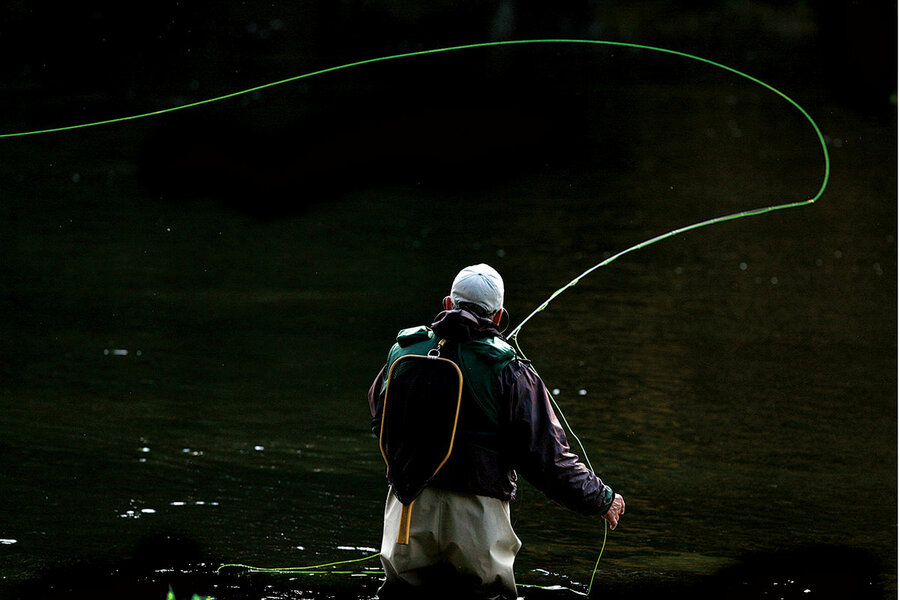Fly-fishing, silence, and common ground: A stepfather’s gift
Loading...
I was 12, and my newly acquired stepfather and I fought over everything. We even fought over math. But still he reached out to try to teach me something he loved.
So one weekend we drove four hours to the Little Truckee River. We marched down a ridge to the river. As the sound of traffic faded, the gurgling of the water rose. I feared that what lay ahead was an interminable conversation about responsibility and expectations. But instead, my stepfather turned aside, walked upstream, and began to cast.
Why We Wrote This
Sometimes the best way to communicate with someone is to share a pleasant experience together, wordlessly.
I went my own way – fishing just like he had shown me countless times before. Soon I wasn’t thinking about my usual concerns: girls, school, sports, defying my parents, and girls. I was wading into dark waters to cast – wearing no waders.
My stepfather finally caught up to me. As we walked back to the truck, a conversation germinated that lasted most of the way home. Not a word was said about my attitude, my grades, or his skill as a father. We’d left all that at the Little Truckee.
We still bickered for years after that. But we’d found common ground. And now I see what my stepfather did and what he taught me. And I love him for it.
The concrete practice casting ponds of Oakland, California, were truly lacking. Nonetheless, my stepfather was determined to teach me his art. Back, forth, 1 o’clock, 10 o’clock, ticktock, like a poem with iambic meter. I cast, and I cast, and I cast until I could drop that fly into the little floating target ring at almost any given distance, like a stray leaf lightly fluttering to earth. But to what purpose?
I didn’t understand why this repetitive swaying of the rod sent my stepfather to the remotest reaches of fishing country for days on end. But I was to learn.
It’s not uncommon for a 12-year-old to clash with his newly acquired stepfather, and so it was with me and mine. We fought over homework and privileges; we even fought over math. But despite all of this, he still reached out to me to try to teach me something his father had taught him, something he had grown to love.
Why We Wrote This
Sometimes the best way to communicate with someone is to share a pleasant experience together, wordlessly.
So one weekend we made the four-hour drive to the Sierra from Oakland, to the Little Truckee River, just upstream of Stampede Reservoir and downstream of state Route 89. Not much made an impression on me when I was 12, but I do recall the spectacular view of Stampede Reservoir from the ridge above the river – the mountains reflected in the midnight-blue water; the Little Truckee meandering into the lake creating a muddy delta at its mouth, and the massive expanse of evergreens and granite that surrounded the lake.
We marched from the dirt road down the side of the ridge to the river. As the sound of traffic drifted away, I became aware of the gurgling waters. I feared that what lay ahead was a long walk and an eternal conversation about responsibility and expectations. But when we reached the river I was surprised when my stepfather turned aside, walked upstream, and began to cast, searching the holes, pools, eddies, and undercut banks for fish.
The noise from the river precluded any conversation, and he was making it clear that we weren’t here to talk anyway.
I went my own way downstream, clambered over some rocks, got my feet soaked walking the shoreline, and discovered that to cast into certain areas I had to wade out into dark, unknown water without waders. I would, from time to time, sit down in the sun, enjoy a snack, and just take it all in.
I wasn’t at all aware that I wasn’t thinking about the things that usually concerned me: girls, school, sports, defying my parents, and girls. I wasn’t really aware that I hadn’t caught any fish, nor that I’d wandered far from my stepfather. I was pretty much alone. I had severed ties with all of my concerns. I didn’t have to be listening to loud music, I didn’t have to be listening to my parents – I didn’t have to be listening to anyone.
My stepfather finally caught up to me. He had been far more successful than I – it wasn’t the stream’s fault I hadn’t caught anything, it seems. I had much to learn.
As we walked back to the truck, the noise of the river faded. As it did, a conversation germinated between my stepfather and me that lasted most of the way back to Oakland. Not a word was said about my attitude, my grades, or his skill as a father. We’d left all that at the Little Truckee. Even when a tie rod on the truck broke, and we had to walk three miles down a dirt road in the dark to get to the highway, we continued to talk.
It would be too sweet to say that fly-fishing saved my relationship with my stepfather. Back home, we fell into our old ruts. But we had made contact. Or, rather, he had made contact with me. We had found common ground, and we could strive to find our way back to it.
We continued to bicker and argue well into my early 20s; but now, as I raise my own boys, I see what my stepfather did, what he taught me, and I love him for it.







